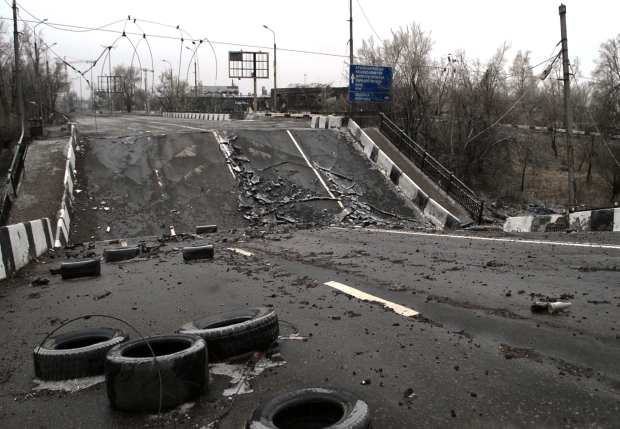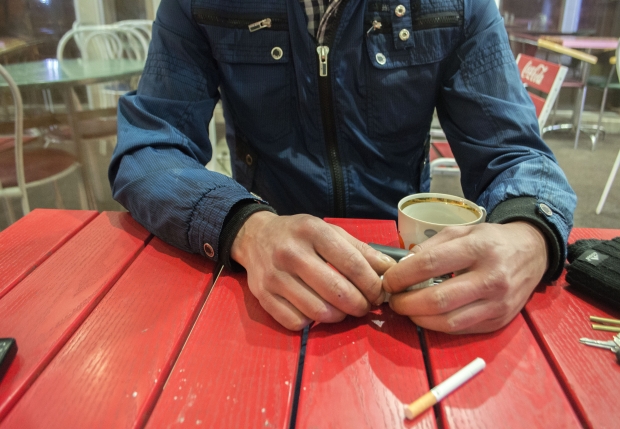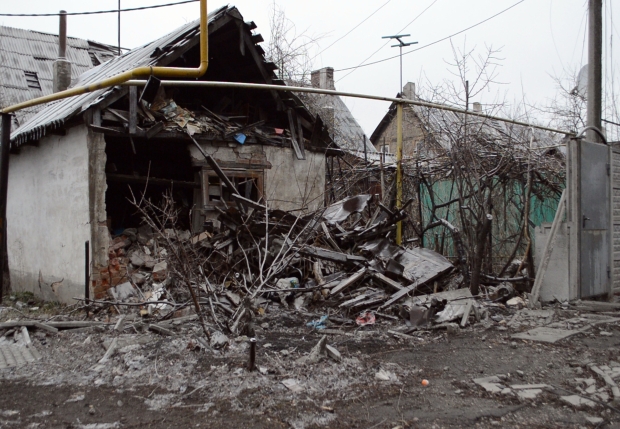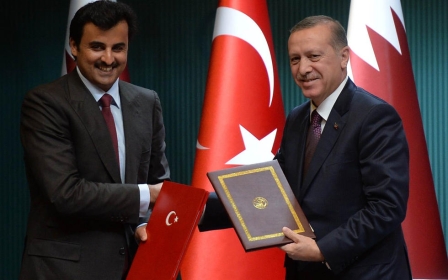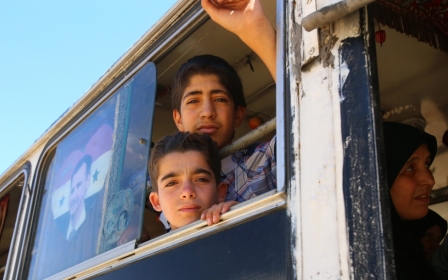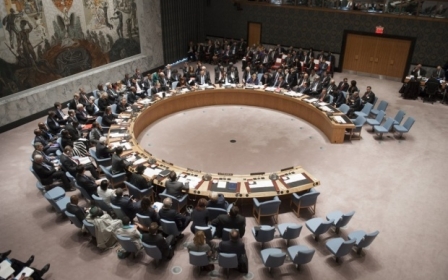Chased by war: Syrian refugees caught in Ukraine warzone
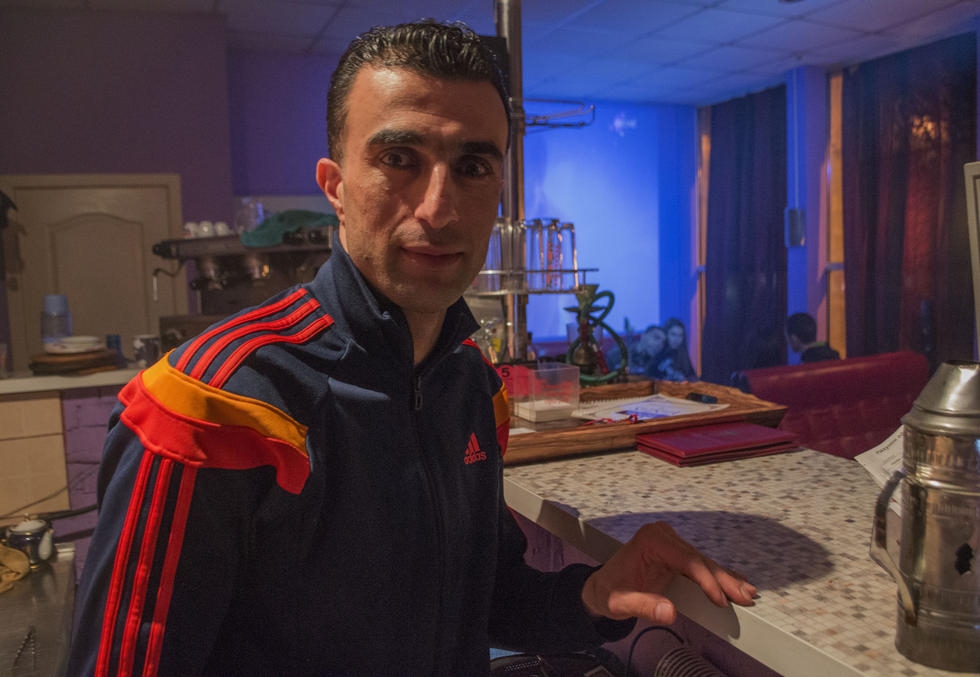
DONETSK, Ukraine - Abdelsattar Nassar’s Shisha House Cafe is one of the few places still open in the city-centre of Donetsk in separatist-controlled East Ukraine. Like most evenings, Nassar was busy darting through the dim smoke-filled room, passing young couples splayed out on black leather stalls and sliding past young separatist fighters in military fatigues while taking orders and delivering shisha pipes to the patrons.
Nassar is a Syrian refugee from Deraa, and without much competition, his business is booming. Most establishments shut down last year due to the constant bombardments on the outskirts of the city.
Nassar came to Donetsk after fleeing the Syrian civil war in 2012 seeking refuge. Relieved to be out of Syria, Nassar and his family started to make a new life for themselves in Ukraine. They bought a house, opened a business, and enrolled their children in school where they took language lessons to better integrate themselves into their new country. Then war broke out in Ukraine.
Nassar couldn’t believe his luck.
Suddenly the sounds of gunfire and bombings filled his living room once more. His children were again terrified, huddling against their parents as they waited for the windows to still and bombings to stop. Donetsk quickly came under the control of pro-Russian separatist rebels in April 2014. Fighting between separatist fighters and government troops raged. The separatists almost immediately declared the city and surrounding region the Donetsk People’s Republic (DNR), a new state separate from the Ukrainian government in Kiev, and one with closer ties to neighbouring Russia.
While a ceasefire was signed mid-February, the sounds of shelling and artillery fire echo daily through Donetsk’s empty streets.
Now in its second year, the war in East Ukraine has claimed the lives of over 6,000 people. Tanks continue to sidle down the streets of Donetsk, trundling towards positions on the edge of the city. The once-gleaming state-of-the-art international airport in Donetsk is completely destroyed, deep blast holes scar buildings throughout the city and hospitals are on the brink of collapse.
“When I heard the bombs on the first day here in Donetsk I knew I had to leave and try and get my family out,” Nassar said, while periodically looking out the window down one of the empty streets. “My café here was hit by gunfire on that first day as well.”
Shisha House Café opened just a few weeks before the war erupted on the streets of Donetsk. As residents fled, Nassar gathered his family up and took them to Kiev - fleeing a second war in two years.
Nassar only managed to stay in Kiev two weeks before having to turn back and take his scared young children back through the fierce fighting that had engulfed their new hometown. Nassar tried to plead asylum to several countries - only the Greek embassy offered any semblance of help, but in the end only gave his youngest daughter, born in Ukraine, a visa for Greece. The rest of the family was told no. When he asked why the embassy would only grant his toddler daughter a visa, and not any other family members, that visa was revoked.
With prices skyrocketing and rent high, staying in Kiev was not an option, and having no family in Ukraine to help them out, Nassar said his only option was to return to Donetsk where at least the family had a roof over their heads.
“We were there [Kiev] for five days but it was impossible to stay there for more than a few days; rent, everything was more than we could afford,” Nassar told Middle East Eye. “There was no work. But in Donetsk we had somewhere to stay. Our only choice was to return. What else could we do? I had no other options.”
Shisha House is one of few businesses that remain open in the city. The stalls are filled with remaining city youth, and separatist fighters. Nassar is always careful with these customers, they can do as they like in the city, he said. More than anything Nassar wishes he could close the doors on the cafe and leave for good, despite the booming business. Every day he feels guilt when he sees his son walk towards school, terrified of stray mortars that sporadically hit the city.
Nassar feels stuck in Donetsk, but he’s not the only one. There are about a dozen Syrian refugees like him stranded in this city, he said - all fled the Syrian conflict, only to end up in an unlikely European warzone.
At a small fast food restaurant a few hundred meters down the road from Shisha House Cafe, Khaled Sijer, rubbed his hands together furiously. He laughed, joking that he’ll never get used to the Eastern Europe weather. Sijer restaurant is a modest establishment, but with a good location in the centre of the city.
Across the road near the restaurant a large propaganda billboard depicts DNR separatists handing out food to hordes of smiling grateful citizens, others down the road portray vast, bountiful fields of crops. The images don’t look like Donetsk in 2015.
Like Nassar, Sijer fled Syria during the beginning of the conflict, sure he would find temporary refuge in Ukraine - the only country outside the Middle East to which he was able to obtain a visa. As the Syrian war escalated in brutality over the years, however, Sijer began to put down roots. He could see the Syrian war didn’t look like dying down and decided to settle in the city. A year after opening his small restaurant, war broke out in Donetsk.
Unlike Nassar however, Sijer never considered fleeing.
“I can’t take that risk,” he said.
While he’s accepted that returning home to Syria could take longer than he ever anticipated, he is still financially supporting his family - including his young daughter - still stranded in Syria. They are the reason he refuses to leave Donetsk despite the ongoing turmoil and the continuing dangers.
“I have to stay in the city; my family rely on me to send them money. They are living in the middle of war in Syria; working for them feels like I am doing at least something for them,” Sijer said. “There was war in Syria and then I came here and there was war in Ukraine. I think if I went to Germany then there would be a war suddenly there too.”
Sijer feels a cruel sense of deja vu about his current predicament. Still, he said, the war in Ukraine pales in comparison to the one in Syria. While he has work in Donetsk, Sijer will remain in the war-ravaged city. His family in Syria, who are currently in contested Aleppo, are his driving force. Even so, with the future of Donetsk uncertain and the civil war in Syria well into its fifth year, he doesn’t hold high hopes that he will see them again in the near future.
“I never thought the war in Syria would go on for so long,” Sijer told MEE. “I didn’t think it would be so bad. I thought I would be gone for six months [and] that the problem would finish. There is a war here in Ukraine, but the war in Syria has broken the whole country, right now I can’t imagine when I will next see my daughter and family again.”
New MEE newsletter: Jerusalem Dispatch
Sign up to get the latest insights and analysis on Israel-Palestine, alongside Turkey Unpacked and other MEE newsletters
Middle East Eye delivers independent and unrivalled coverage and analysis of the Middle East, North Africa and beyond. To learn more about republishing this content and the associated fees, please fill out this form. More about MEE can be found here.


